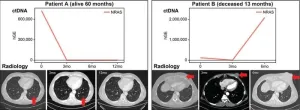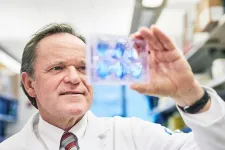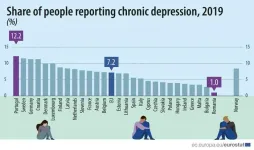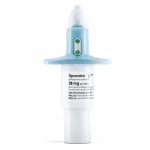(Press-News.org) New research being presented at the Annual Meeting of the European Association for the Study of Diabetes (EASD) in Hamburg, Germany (2-6 Oct) has identified a range of characteristics associated with a higher risk of sudden cardiac arrest in individuals with type 2 diabetes.
These include the some commonly prescribed antibiotic and antipsychotic drugs, prokinetics (drugs used to treat gastrointestinal symptoms such as nausea and vomiting) and low fasting blood sugar.
Sudden cardiac arrest (SCA) is a leading cause of death. The condition, in which the heart suddenly stops pumping blood, is responsible for up to 50% cardiac deaths and 20% of mortality in high-income countries.
People with type 2 diabetes (T2D) have a two-fold increased risk of SCA. However, SCA is still difficult to predict, particularly in those without a history of cardiovascular disease (CVD).
Peter Harms, of Amsterdam UMC, Amsterdam, The Netherlands, and colleagues carried out a case control study to assess which clinical characteristics in GP records are associated with SCA in people with T2D with and without a CVD history.
The study involved 3,919 individuals with T2D: 689 cases and 3,230 controls. The cases, individuals who had a sudden cardiac arrest in the in the Dutch region of Noord-Holland from 2010-2019, were each matched by age, sex and GP practice with up to five non-SCA controls.
Clinical measurements including blood pressure and blood glucose readings, medication use and medical history for five years leading up to case’s SCA were obtained from GP records. Measurements not recorded in the records were classified as “unknown”.
Several characteristics were associated with an increased risk of SCA in both people with and without CVD: history of arrythmias (68% increase in risk of SCA), unknown smoking behaviour (40% increase), insulin use (138% increase) and QTc-prolonging prokinetic medication (66% increase)
Many common drugs, including some prokinetic, antibiotic and anti-psychotic medications, are associated with a change in functioning of the heart’s electrical system known as QT-prolongation and are described as being QTc-prolonging. QTc-prolonging prokinetics include domperidone; QTc-prolonging antibiotics include marcolides and fluoroquinolones; QTc-prolonging antipsychotics include haloperidol.
In people with CVD (352 cases/1,207 controls), moderate (54% increase in risk), severe (55% increase) and unknown albuminuria (90% increase) and heart failure (85% increase) were associated with SCA.
In those without CVD (337 cases/2,023 controls), low fasting glucose – an indication of too strict glycaemic control (<4.5 mmol/mol: 150% increase), severely high systolic blood pressure (>180mmHg: 121% increase), low HDL cholesterol (<1.0 mmol/l: 35% increase), high LDL cholesterol (>2.6 mmol/l: 64% increase), QTc-prolonging anti-psychotic medication (187% increase) and QTc-prolonging antibiotic medication (66% increase) use were associated with SCA.
The researchers conclude: “In people with T2D with CVD, albuminuria, heart failure and QTc-prolonging prokinetic medication use are associated with risk of SCA, while in people with T2D without a CVD history, low fasting glucose, severe hypertension, dyslipidaemia (unhealthy levels of blood fats) and the use of QTc-prolonging antibiotic, antipsychotic and prokinetic medication are associated with SCA risk.”
Mr Harms adds: “GPs will already be aware that classic cardiovascular risk factors such as high blood pressure raise the risk of sudden cardiac arrest in people with type 2 diabetes, however, the link with low fasting glucose and antibiotic, antipsychotic and prokinetic medication is less well-known.
“Our results underline the need for GPs to be aware of the hazards of too strict glycaemic control and the prescription of commonly used antibiotics, antipsychotics and prokinetics.”
For more information, or to arrange an interview, please contact Mr Harms by email:
Peter Harms, Amsterdam UMC, Amsterdam, The Netherlands. E) p.p.harms@amsterdamumc.nl
Alternative contact: Tony Kirby in the EASD Media Centre. T) +44 7834 385827 E) tony@tonykirby.com
Notes to editors:
This press release is based on oral presentation 172 at the annual meeting of the European Association for the Study of Diabetes (EASD). The material has been peer reviewed by the congress selection committee. There is no full paper at this stage and, as it is an oral presentation, there is no poster. The author is happy to answer your questions
END
Commonly prescribed antibiotic, antipsychotic and prokinetic drugs are associated with a higher risk of sudden cardiac arrest (SCA) in people with type 2 diabetes, study finds
Low fasting blood sugar also linked with SCA, a leading cause of death
2023-10-05
ELSE PRESS RELEASES FROM THIS DATE:
Study reveals distinct illness trajectory in the years leading up to type 2 diabetes diagnosis
2023-10-05
New research presented at this year’s Annual Meeting of The European Association for the Study of Diabetes (EASD), Hamburg (2-6 Oct), reveals a marked increase in several common conditions in the years leading up to, and immediately prior to, type 2 diabetes diagnosis, suggesting considerably earlier diagnosis might be possible in some patients.
“These novel insights into the onset and natural progression of type 2 diabetes, suggest an early phase of inflammation-related disease activity long before any clinical diagnosis of type 2 diabetes is made”, says senior author Dr Adrian Heald from Manchester ...
Is lasting remission of type 2 diabetes feasible in the real-world setting?
2023-10-05
At this year’s Annual Meeting of the European Association for the Study of Diabetes (EASD) in Hamburg, Germany (2-6 Oct) experts will discuss if lasting remission from diabetes is feasible in the real-world setting.
Professor Roy Taylor of Newcastle University, Newcastle, UK, will be speaking in support of the motion
Professor Taylor will argue that through a series of studies in which people with type 2 diabetes were put on low calorie diets, he has shown that lasting remission of type 2 diabetes is indeed feasible in the real world.
He will begin ...
Second international consensus report - clinical translation of precision diabetes medicine
2023-10-05
Precision medicine is part of the logical evolution of contemporary evidence-based medicine that seeks to reduce errors and optimise outcomes when making medical decisions and health recommendations. Diabetes affects hundreds of millions of people worldwide, many of whom will develop life-threatening complications and die prematurely.
“Diabetes recommendations often focus on what works well for the average person. However, because diabetes is an incredibly heterogeneous disease, few people are Mr or Mrs “average” and one-size-fits-all ...
Wastewater surveillance research provides a 12-day lead time for RSV season: new study
2023-10-04
In a first-of-its-kind study, researchers using wastewater surveillance over conventional indicators have predicted the start of the annual respiratory syncytial virus (RSV) season 12 days early, providing more lead time for hospital preparedness and the timely initiation of RSV prevention therapy provided by the province for at risk-infants and young children.
Published in Frontiers in Public Health, the study is the first to describe the relationship between wastewater measurements and clinical data for RSV and to use near real-time wastewater measurements to accurately identify the start of the RSV season.
Working in close collaboration with CHEO Research Institute (RI) ...
Unmet health needs for HIV, hypertension and diabetes in rural South Africa
2023-10-04
The burden of non-communicable diseases like hypertension and diabetes is increasing globally, especially in low-income and middle-income countries where they occur alongside epidemics of communicable diseases like HIV. A large public health survey in South Africa led by Emily Wong, M.D., has assessed the multimorbidity health needs of individuals and communities in rural KwaZulu-Natal and established a framework to quantify met and unmet health needs for individuals living with infectious and non-communicable diseases. The study is published in The Lancet Global Health.
“Applying ...
Blood-based biomarker may redefine the future treatment for advanced melanoma
2023-10-04
Circulating tumor DNA (ctDNA) is emerging as a blood-based biomarker for many solid tumor types, including melanoma. A new study that assessed ctDNA in the blood of patients with BRAF wild-type (BRAF WT) stage III and IV melanoma concludes that measuring ctDNA may lead to alternative treatment options and better outcomes for these patients, report investigators in The Journal of Molecular Diagnostics, published by Elsevier.
For patients with BRAF WT stage III and IV melanoma, there is an urgent clinical need to identify prognostic biomarkers and biomarkers to predict treatment ...
Advances from MSK researchers reported at 2023 ASTRO Meeting
2023-10-04
Researchers from Memorial Sloan Kettering Cancer Center (MSK) were recognized for their achievements at the 2023 meeting of ASTRO, the American Society for Therapeutic Radiology and Oncology. Teams reported new findings about radiation-induced secondary cancers, a new guidance system for radiation therapy, and the consequences of insurance denials, among other topics.
At the meeting, held from October 1 to October 4, 2023, in San Diego, Simon Powell, MD, PhD, FRCP, Chair of MSK’s Department of Radiation Oncology and Enid A. Haupt Chair in Radiation Oncology, was honored with ASTRO’s Gold Medal Award. This award is ASTRO’s highest honor, bestowed upon ...
Ketamine-related drug gives better treatment for difficult to treat clinical depression
2023-10-04
Type of work: peer-reviewed/clinical trial/people
A major clinical trial shows that the drug, esketamine, one of the two main forms of ketamine, outperforms one of the standard treatments for treatment-resistant major depression. This industry-funded work is presented for the first time at the 36th ECNP Congress in Barcelona, with publication in the peer-reviewed journal the New England Journal of Medicine (see Notes for details).
Clinical depression (also known as MDD, major depressive disorder) affects a significant number of people at any one time, giving ...
Esketamine nasal spray: an option for patients with treatment-resistant depression
2023-10-04
Understanding Treatment-Resistant Depression
Treatment-resistant depression (TRD) is a particularly challenging form of major depressive disorder. As Albino Oliveira-Maia, head of the Champalimaud Foundation’s Neuropsychiatry Unit and the study’s national coordinator for Portugal, explains, “TRD is defined as the persistence of depressive symptoms despite adequate courses of at least two different antidepressant medications”. Despite repeated therapeutic attempts, these patients’ depressive symptoms ...
Navigating moiré physics and photonics with band offset tuning
2023-10-04
When two lattices with distinct angles or periodicities come together, they conjure a moiré superlattice — a realm where astonishing phenomena like superconductivity and optical solitons spring to life. At the heart of this realm lies the moiré flatband, a key player in shaping advanced light–matter interactions, such as laser emission and second harmonic generation. In moiré physics and its relevant applications, wielding control over flatbands is a pivotal superpower.
Moiré flatbands are typically generated with special structures, often manipulated ...
LAST 30 PRESS RELEASES:
This ancient plant-eater had a twisted jaw and sideways-facing teeth
Jackdaw chicks listen to adults to learn about predators
Toxic algal bloom has taken a heavy toll on mental health
Beyond silicon: SKKU team presents Indium Selenide roadmap for ultra-low-power AI and quantum computing
Sugar comforts newborn babies during painful procedures
Pollen exposure linked to poorer exam results taken at the end of secondary school
7 hours 18 mins may be optimal sleep length for avoiding type 2 diabetes precursor
Around 6 deaths a year linked to clubbing in the UK
Children’s development set back years by Covid lockdowns, study reveals
Four decades of data give unique insight into the Sun’s inner life
Urban trees can absorb more CO₂ than cars emit during summer
Fund for Science and Technology awards $15 million to Scripps Oceanography
New NIH grant advances Lupus protein research
New farm-scale biochar system could cut agricultural emissions by 75 percent while removing carbon from the atmosphere
From herbal waste to high performance clean water material: Turning traditional medicine residues into powerful biochar
New sulfur-iron biochar shows powerful ability to lock up arsenic and cadmium in contaminated soils
AI-driven chart review accurately identifies potential rare disease trial participants in new study
Paleontologist Stephen Chester and colleagues reveal new clues about early primate evolution
UF research finds a gentler way to treat aggressive gum disease
Strong alcohol policy could reduce cancer in Canada
Air pollution from wildfires linked to higher rate of stroke
Tiny flows, big insights: microfluidics system boosts super-resolution microscopy
Pennington Biomedical researcher publishes editorial in leading American Heart Association journal
New tool reveals the secrets of HIV-infected cells
HMH scientists calculate breathing-brain wave rhythms in deepest sleep
Electron microscopy shows ‘mouse bite’ defects in semiconductors
Ochsner Children's CEO joins Make-A-Wish Board
Research spotlight: Exploring the neural basis of visual imagination
Wildlife imaging shows that AI models aren’t as smart as we think
Prolonged drought linked to instability in key nitrogen-cycling microbes in Connecticut salt marsh
[Press-News.org] Commonly prescribed antibiotic, antipsychotic and prokinetic drugs are associated with a higher risk of sudden cardiac arrest (SCA) in people with type 2 diabetes, study findsLow fasting blood sugar also linked with SCA, a leading cause of death





